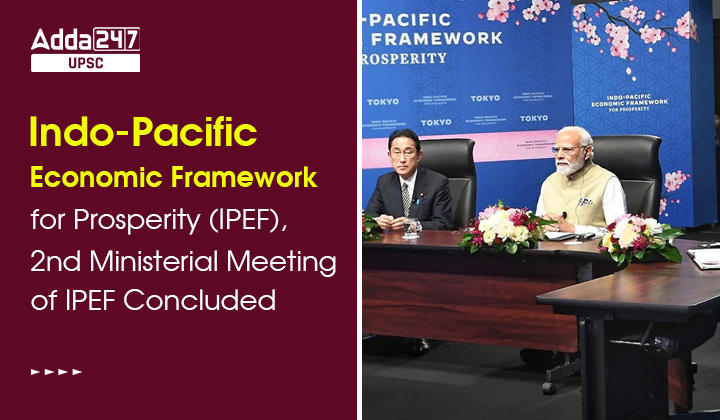Table of Contents
Indo-Pacific Economic Framework for Prosperity (IPEF): It is a US-led framework for participating countries to solidify their relationships and engage in crucial economic and trade matters that concern the region, such as building resilient supply chains battered by the pandemic. Indo-Pacific Economic Framework for Prosperity (IPEF) is also important for UPSC Prelims Exam and UPSC Mains Exam (GS Paper 2- International Relations, Various International Groupings having India as a member/Affecting India’s Interests).
2nd IPEF Ministerial Meeting in News
The second in-person Indo-Pacific Economic Framework (IPEF) Ministerial Meeting, which took place in Detroit, marked significant progress in the negotiations for the Supply Chains (Pillar-II) Agreement.
IPEF Supply Chain Agreement Objectives
India and other partner countries are committed to actively engaging in the effective implementation of the IPEF Supply Chains (Pillar-II) Agreement to achieve its overall objectives. The Agreement represents one of the most expeditiously concluded plurilateral economic cooperation agreements to date. The IPEF Supply Chains (Pillar-II) Agreement is one of the fastest ever concluded plurilateral economic cooperation Agreements. Under this Agreement, IPEF partner countries are seeking to-
- Make supply chains more resilient, robust, and well-integrated through crisis response measures;
- Cooperation for mitigation of the effect of disruptions to better ensure business continuity, and improve logistics and connectivity;
- Promoting investments particularly in critical sectors and production of key goods;
- Worker role enhancement through requisite upskilling and reskilling, and increasing comparability of skills credentials frameworks across IPEF and
- Cooperative and collaborative efforts among the IPEF partners.
IPEF Supply Chain Agreement Benefits
Upon its implementation, the Supply Chain Agreement is anticipated to yield several advantages for India and other partner countries within the Indo-Pacific Economic Framework (IPEF). Some of the key expected benefits include:
- Potential relocation of production centers in critical sectors to India.
- Strengthening of domestic manufacturing capabilities.
- Support for the Aatmanirbhar Bharat (Self-Reliant India) and Production Linked Initiatives schemes.
- Mobilization of investments, particularly in key goods production, logistics services, and infrastructure.
- Deeper integration of Indian micro, small, and medium enterprises (MSMEs) in global supply and value chains.
- Expansion of India’s exports and participation in higher-value segments of the supply chains.
- Mitigation of economic risks arising from supply chain shocks or adverse events.
- Creation of a seamless regional trade ecosystem, facilitating the flow of Indian products.
- Enhanced trade facilitation through digital exchange of trade documentation and expedited port clearances.
- Collaborative research and development efforts.
- Workforce development initiatives.
In summary, the implementation of the Supply Chain Agreement is expected to bring about diverse benefits encompassing economic growth, resilience, trade facilitation, and capacity building.
What is IPEF?
Indo-Pacific Economic Framework for Prosperity (IPEF) is a US-led framework for participating countries to solidify their relationships and engage in crucial economic and trade matters that concern the region, such as building resilient supply chains battered by the pandemic. Indo-Pacific Economic Framework for Prosperity (IPEF) is not a free trade agreement. No market access or tariff reductions have been outlined, although experts say it can pave the way to trade deals.
Indo-Pacific Economic Framework for Prosperity (IPEF) Details
On May 23, 2022, the United States and partner countries from the Indo-Pacific region jointly launched the Indo-Pacific Economic Framework (IPEF) in Tokyo.
- Mandate: Indo-Pacific Economic Framework (IPEF) seeks to strengthen economic engagement among partner countries with the goal of advancing growth, peace and prosperity in the region.
- IPEF Member Countries: IPEF has 14 partner countries including Australia, Brunei, Fiji, India, Indonesia, Japan, Republic of Korea, Malaysia, New Zealand, Philippines, Singapore, Thailand, Vietnam & USA.
- IPEF Pillars: The framework is structured around four pillars relating to Trade (Pillar I); Supply Chains (Pillar II); Clean Economy (Pillar III); and Fair Economy (Pillar IV).
- India and IPEF Pillars: India had joined Pillars II to IV of IPEF while it has an observer status in Pillar-I.
IPEF Significance
The primary objective of the Indo-Pacific Economic Framework (IPEF), launched by the 14 partner countries in the region, is to foster cooperation, stability, prosperity, development, and peace.
- This collaborative framework is designed-
- To deliver concrete advantages by stimulating economic activity,
- Attracting investments,
- Promoting sustainable and inclusive economic growth, and
- Benefiting both workers and consumers throughout the region.
- The 14 IPEF partner countries collectively represent 40 percent of global GDP and 28 percent of global trade in goods and services.
India- EU Trade and Technology Council, 1st Ministerial Meeting to be Held in Brussels
India- EU Trade and Technology Council, 1st Ministerial Meeting to be Held in Brussels



 TSPSC Group 1 Question Paper 2024, Downl...
TSPSC Group 1 Question Paper 2024, Downl...
 TSPSC Group 1 Answer key 2024 Out, Downl...
TSPSC Group 1 Answer key 2024 Out, Downl...
 UPSC Prelims 2024 Question Paper, Downlo...
UPSC Prelims 2024 Question Paper, Downlo...




